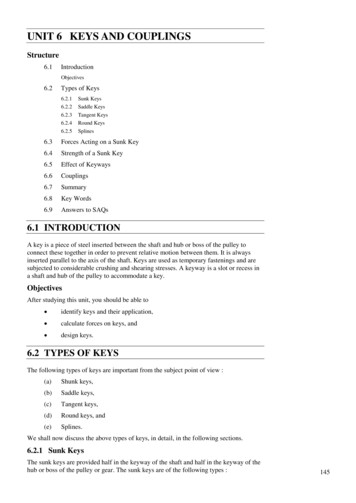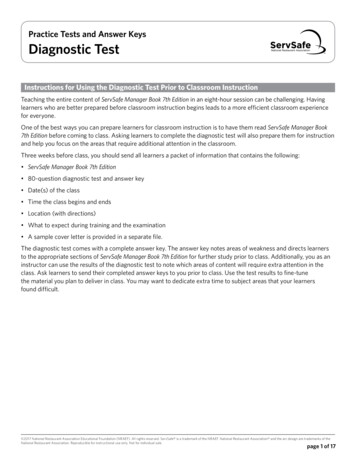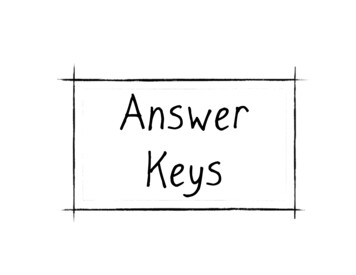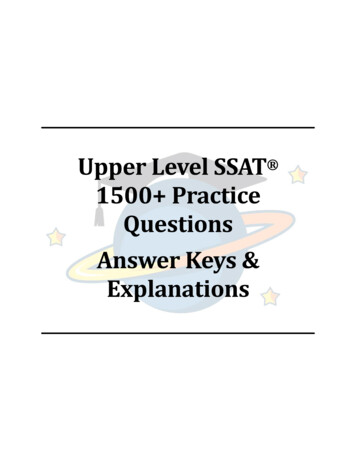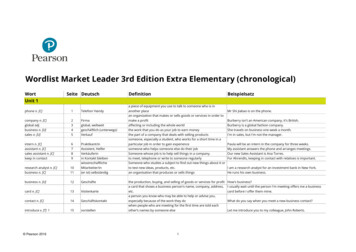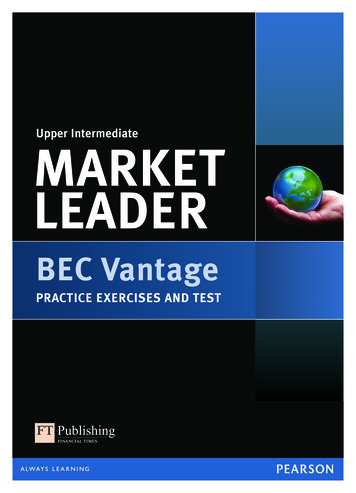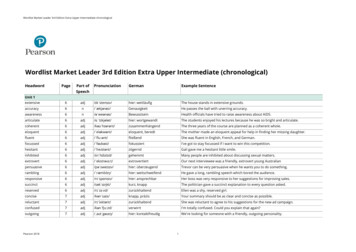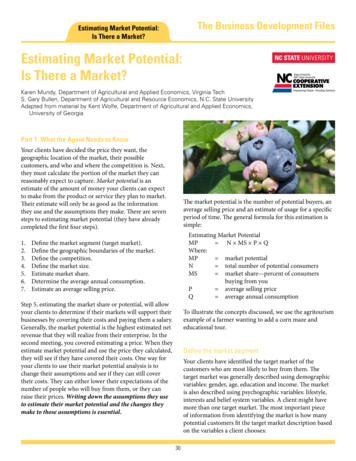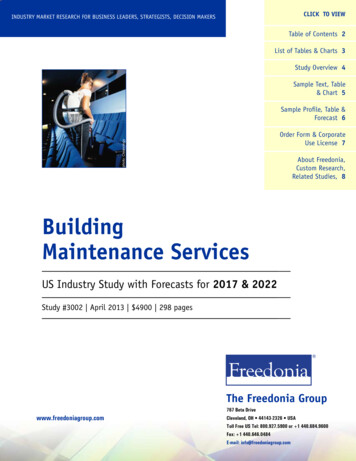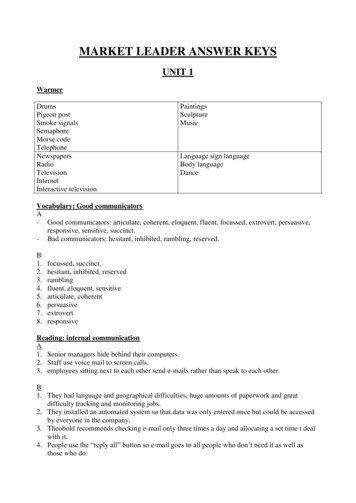
Transcription
MARKET LEADER ANSWER KEYSUNIT 1WarmerDrumsPigeon postSmoke signalsSemaphoreMorse ractive televisionPaintingsSculptureMusicLanguage sign languageBody languageDanceVocabulary: Good communicatorsA- Good communicators: articulate, coherent, eloquent, fluent, focussed, extrovert, persuasive,responsive, sensitive, succinct.- Bad communicators: hesitant, inhibited, rambling, reserved.B1.2.3.4.5.6.7.8.focussed, succinct.hesitant, inhibited, reservedramblingfluent, eloquent, sensitivearticulate, coherentpersuasiveextrovertresponsiveReading: internal communicationA1. Senior managers hide behind their computers.2. Staff use voice mail to screen calls.3. employees sitting next to each other send e-mails rather than speak to each other.B1. They had language and geographical difficulties, huge amounts of paperwork and greatdifficulty tracking and monitoring jobs.2. They installed an automated system so that data was only entered once but could be accessedby everyone in the company.3. Theobold recommends checking e-mail only three times a day and allocating a set time t dealwith it.4. People use the “reply all” button so e-mail goes to all people who don‟t need it as well asthose who do.
5. both departments felt their job security was threatened so they didn‟t communicate with theirsrivals.6. It is a waste of time unless you also sort out the group dynamics of the actoriesexperiencetruthsupportidease-mailsLanguage review: IdiomsAa) nutshellf) wavelengthb) pointg) tailc) grapevineh) purposed) picturei) brushe) stickj) winesB1.2.3.4.gfajheC1.2.3.4.5.bfdhi5.6.7.8.idbc6. c7. a8. e9. g10. jCase study1CompanyActivityBased inChanges in structure since thetakeoverGloria Richter‟s e-mail to GuntherSchmidtKey points of Ursula Krieger‟s e-HCPSPrivate health careGeneva, SwitzerlandMore centralised. More decisions made by top managementat head office- Staff receiving too many e-mails, many of which don‟tneed to be sent. Checking and sorting these ispreventing them from getting on with their real work- Staff lounge has been taken away and her staff doesn‟thave the opportunity to meet people from otherdepartments anymore .- Middle managers confused about who to report to
mail to Chris Wright-Planned reorganisation hasn‟t happened yet so no oneknows what‟s going onNo one will take responsibility for authorising financialpayments – departments heads unhappy that they can‟tget a quick answer when they need to spend money2Type of problemOrganisationDocumentsDescription of problemStaff concern about forming new teamsAre too many reports required? Are thecontrasts with costumers too complicated?The distance between buildings is creatingcommunication problems.Communication problems caused a loss of animportant customer. Staff dealing with customerrelations want more money for moreresponsibility/duties.Lack of trust in management. Flexitimeunpopular with one member of staff.Location of premisesCustomer relationsOther problems3Possible answers1. Staff should check e-mails at fixed times throughout the day, e.g. early morning and lateafternoon only.2. „Get together‟ meetings and social events should be held so that staff from the two side of theorganisation (HCP and Sanicorp) can get to know each other better.3. the management should consider giving more authority and decision-making power to middlemanagers, i.e. decentralise the management route.4. HCPS could produce a new, revised organigram /organisation chart so that reportingproducers are clear.5. the management could consider setting up a staff or consider other ways of developinginformal communication, e.g. staff outing, encouraging managers to meet staff after work, etc.6. the management could review their policy concerning flexitime, following a survey of staffattitudes.UNIT 2Starting upAExamples include:- food: Nestlé, Danone- Drink: Coca-Cola, Starbucks- Electrical equipment: Sony, Zanussi- Clothing: Gap, Benetton, Zara- Construction: Bechtel, Halliburton, ABBB1. Advantages include being able to buy raw materials in large quantities at lower prices, andbeing able to spread administrative and other costs over a larger number of products sold.
2. problems may include not understanding local tastes and habits, and not understanding thestructure of local distribution networks.3. for methods of entering overseas markets see business brief on page 17.Vocabulary: collocationA1. monetary regulation2. government bureaucracy3. political stability4. buying habits5. economic situation6. income distributionC1. d2. c3. b4. c2.3.4.5.6.5. b6. a7. dexamples might include top-of –the range cars, life-coaching, etc.domesticwithdrawslogana retailer sells to general public, a wholesaler sells to a retailer, usually in large quantities.Reading: coffee cultureB1. Chile2. Chile3. brazil4. the US5. Argentina, PeruC1.2.3.4.5.6.Pike Place Market, Seattle in 1971.a) 3,907 b) 437a) 1,378 b) 1,180Japanairline offices, sports stadiums, hotels, bookshopsHome market saturation, bad experience in Japan, security problems in Israel, opposition fromanti-globalisation movement.Da) 2, 6, 8, 10, 11, 12b) 1, 3, 4, 5, 7, 9Ea) 2, 4, 5, 6, 9, 10, 11b) 1, 3, 5, 7, 8, 12
Skills: brainstormingA1. yes, but sometimes it is good to be vague about the purpose of the meeting, so thatparticipants don‟t look immediately at the specific solution. This will keep the discussionmore open-ended and throw up ideas that otherwise might not have occurred.2. theoretically, no. the idea is to get everyone involved as equal. But people in some cultureswould always expect the most senior to speak first, whatever the type of meeting.3. probably a good idea.4. this should be on e of the main features of brainstorming, but sessions where this actuallyhappens must be rare.5. in theory, yes, but extremely bizarre suggestions would probably be seen as such.6. easier said than done, but it‟s probably more acceptable to interrupt in brainstorming thanother type of session.7. theoretically, the speculation should be as wide-ranging as possible, but most participantswould probably set limits as to what is relevant.8. probably a good idea. Details can come later in developing particular ideas.DStarting objectivesThe purpose of the meeting this morning is What we need to achieve today is Our objective here is to.T/NST/NEncouraging contributionsDon‟t hold back „fire away‟Say whatever comes to mind.Any other ideas?Would it be worth sponsoring some kind of events?What about that?SST/NT/NT/NT/NExpressing enthusiasmThat‟s great!That‟s the best idea I‟ve heard for long time,That‟s an excellent suggestion.Excellent!We should definitely do some of that.Absolutely!SSSSSSMaking suggestionsI think we could.I suggest we One thing we could do is.I think we‟d reach a great audience What about press advertising?Would it be worth sponsoring some kind of events?It would be great to do a presentation T/NT/NT/NT/NT/NT/NSAgreeingYes, that‟s a good idea because.S
Exactly because.You‟re absolutely right because.Excellent!We should definitely do some of that.Absolutely!That might be one way SSSSST/NCase studyZumo – creating a global brandACompanyZumospaActivityFood and drinkBased inValencia, SpainHistoryDeveloped nationally, then globally, with acquisitions worldwideMethodsInnovative advertising and marketing; careful selection of products; marketinground the world through regional officesProductsMany food and drink products, household namesSalesProfitPosition Zumospa‟s product portfolioAmbitions 30million, 20% of Zumospa‟s total sales 4.5 millionCash cowTo make Zumo a global brandUNIT 3Vocabulary: describing relationsAPositive meaningBuild up 5.damageestablishstrengthenedunderminedimproving6. disrupted7. broke off8. jeopardise9. building up10. fosteredNegative meaningBreak off relationsCut offDisruptEndangerJeopardiseDamageSourundermine
C1.2.3.4.5.edbacReading: AIG knows everyoneAb) insuranceB166:AIG‟s capitalisation in billion dollars1992: the year that AIG became the first foreign insurer to be allowed into China.1919: the year that AIG was founded.80,000: the number of people employed by AIG130: the number of countries in which AIG has affiliated agentsCMaurice Greenberg: the Chairman of AIGCornelius Vander Strann: an American entrepreneur, the founder of AIGEdmund Tse: the man who runs AIG‟s Asian operations and life insurance worldwide.DThe company‟s long-standing presence in the areaMaurice Greenberg‟s constant focus on the region and persistent lobbying on behalf of thecompany in China.The company‟s constant pursuit of close relationships with Asian governments, regulators andpowerful businessmenE1. AIG‟s objective is to get unrestricted access to China‟s vast insurance market.2. he sees his role as forging relationships with government and influential people byrepresenting the company in high-level discussions3. Asia is a growth area for insurance and if the company is to continue to grow, it needs tomaintain its strength is Asia and increase it by expanding into China.FPursue relationships (lines 49-50)Build relationships (line 56)Forge relationships (lines 82-83)G1.2.3.4.5.6.7.untapped potentiallong-standing presenceunrestricted accessaffiliated agentsemerging marketshigh-level discussionsleading nations
Language review; multi-word verbsB1.2.3.4.5.Get on really wellcount onbuild uphold on toput it off6. Sounded out7. Let (us) down8. Set up9. Draw up10. call (it) offC1. we‟ll have to call the meeting off tomorrow. / We‟ll have to call off the meeting tomorrow.2. let‟s put off the presentation until next Sunday. / let‟s put the presentation off until next week.3. we know our suppliers will never let us down. / we can count on our suppliers to meet thedeadlines.4. We have now set up a first class distribution network in Europe.5. Could you please draw up a contract as soon as possible. / Could you please draw a contractup as soon as possible.6. could you set up a meeting with them for the next week. / Could you set a meeting up withthem for the next week.7. we‟ve held on the same market share that we had last year.8. the new sales manager gets on really well with this team.Skills: networkingDA. Haven‟t we met somewhere before?B. Yes, it was at the group sales conference in Portugal last year.A. Oh yes. Very good conference, wasn‟t it?B. We both went to that presentation on networking skills.A. That‟s right! It was one of the most interesting at the conference.Case study – getting to know youBackgroundCompanyKimsoongActivityCar manufacturerBased inKorea, European HQ near ParisStructureRetail franchises in most European countries; also tyre andexhaust-fitting servicesSpecial features of the companyReliability at low pricesBasic models include many features that are usually optionsEnvironmentally awareSocial conscience- makes donations to environmental groups- eco-car under developmentActions- Look after existing costumers well. Developbetter understanding of customers throughaccurate customer profile.- Customer loyalty programme (cost sharedHoped-for benefitsTo build up long-term relationships – customersmay buy 3 or 4 cars over 10-year period therebyincreasing profits.
-50/50 with franchises).To encourage staff to be more active inbuilding up good customer relations.UNIT 5Vocabulary: synonyms and word yburnoutpay5. perks6. golden handshake7. appraisalC1. a) satisfied b) dissatisfiedc) satisfaction2. a) motivatingb) demotivatedc) motivation3. a) frustrationb) frustratingc) frustratedReading: perks that workB1. lines 88 to 932. lines 94 to 1073. lines 36 to 554. lines 58 to 835. lines 24 to 326. lines 9 to 14C1.2.3.4.5.6.7.8.personal problems (line 13)financial planning (line 14)top performers (line 26)general manager (lines 63-64)common sense (line 69)social responsibility (line 75)corporate culture (line 84)employee loyalty (line 98)D1.2.3.4.personal problems 5. social responsibilityemployee loyalty 6. top performersgeneral manager7. common sensecorporate culture
Language review: passivesA1c2e3h4d5dB1.2.3.4.6g7a8fhave been conducted 5. were paidbe perceived6. were paidare entered7. is reducedwere givenCProcedureQuestionnaires were distributed to all departments.Al managers were interviewed.A sample of workers was canvassed.Present problemsStaff are not being consulted.Flexitime is not being allowed.Measures to improve job satisfaction since MarchStaff have been consulted properly.Research into flexitime has been carried out.Incentive recommendationsA new scheme should be introduced from 1 Nov.A system of team bonuses should be adopted.Further research should be carried out into a share option scheme.Skills: handling difficult situationsA1h2g3d4e5f6bD1.2.3.4.7a8cthat‟s really bad luck. I know how you must feel.I don‟t know how to tell you this but.I was thinking that it would be good to have a chance to talk about the contract over dinner.I hope you don‟t mind me saying this, but actually it‟s not very comfortable. Would it bepossible to move?Case study – office attraction1Working atmosphere preferred by Karl Jansen,MDStaff rule bookCompany cultureWorking hoursCompetition with other companies ad its effectsClose relationships between members of staffRelaxedSlimCasual, maybe too casualLongFierce, causing stress among employeesIncreasingly common
SubjectMain pointPolicy on office relationshipsKJ‟s concern about relationships between members ofstaffResult of three recent relationshipsDamaged performance of those concerned as well as thatof colleaguesNames of those involved and nature of Tania Lordan-appointmentproblemsJohn Goodman- re-assignmentDerek Hartman- complaintsUNIT 7Warmer2. e-mail3. e-business4. e-conomy5. e-tailing6. e-fulfilmentVocabulary: Internet termsABrowse: to look through a series o
MARKET LEADER ANSWER KEYS UNIT 1 Warmer Drums Pigeon post Smoke signals Semaphore Morse code Telephone Paintings Sculpture Music Newspapers Radio Television Internet Interactive television Language sign language Body language Dance Vocabulary: Good communicators A - Good communicators: articulate, coherent, eloquent, fluent, focussed, extrovert, persuasive, responsive, File Size: 220KBPage Count: 21
